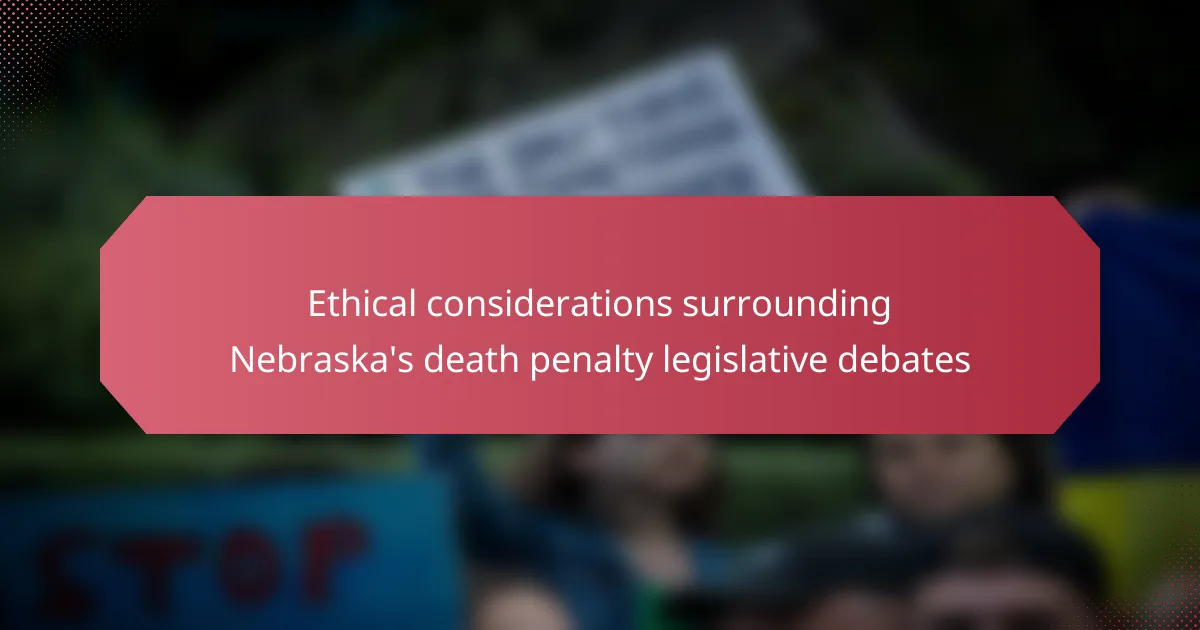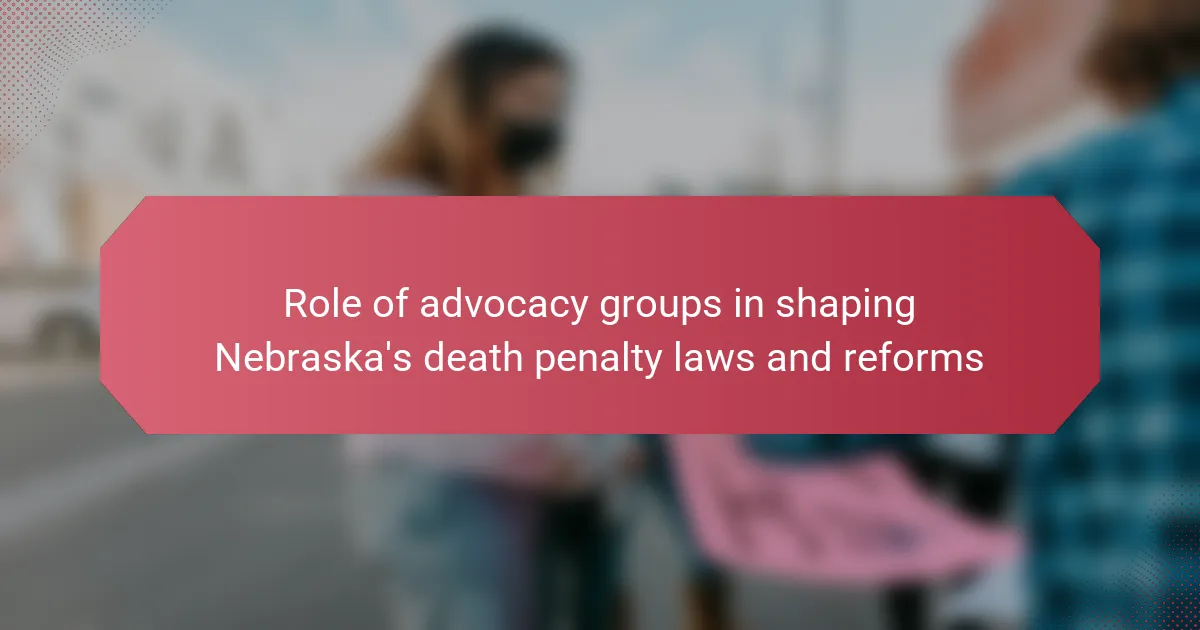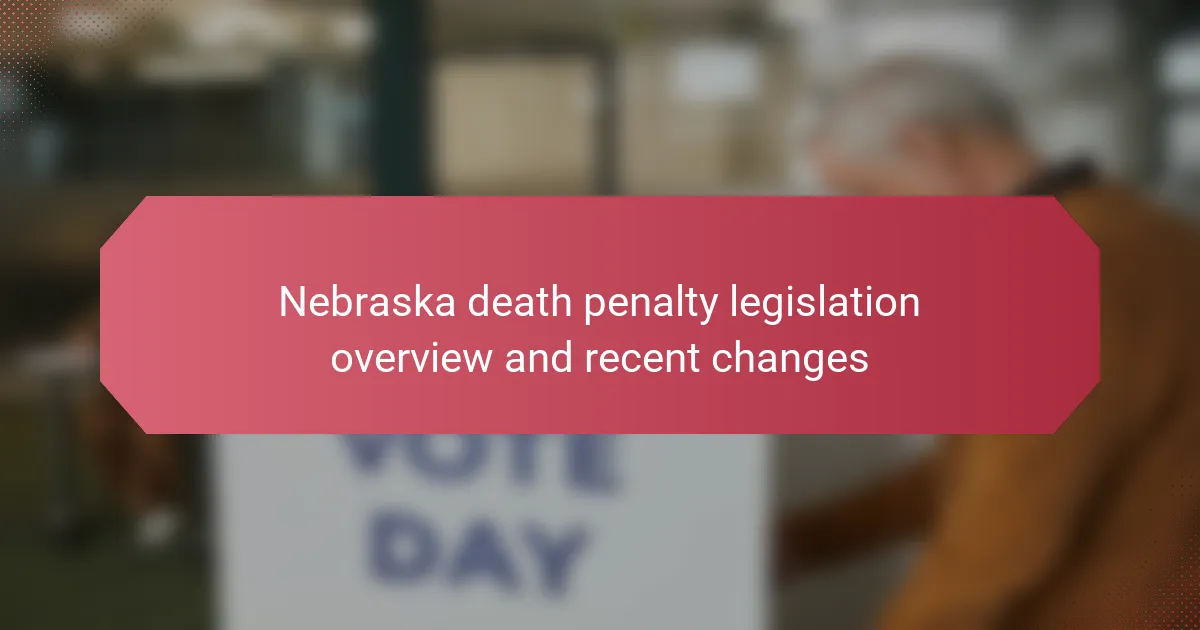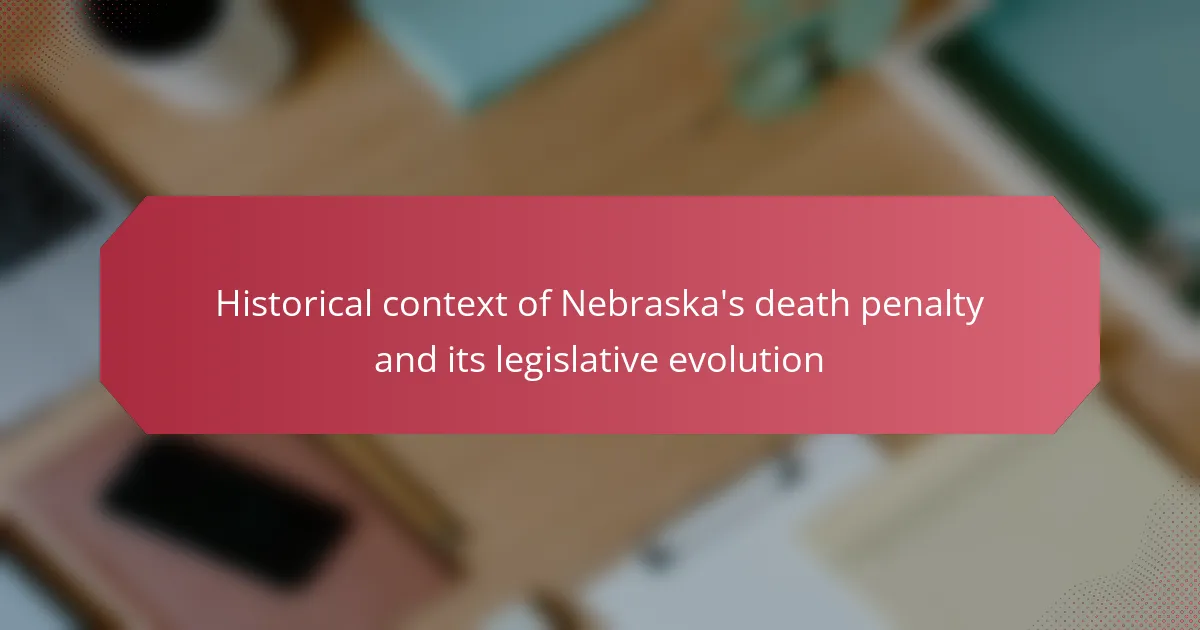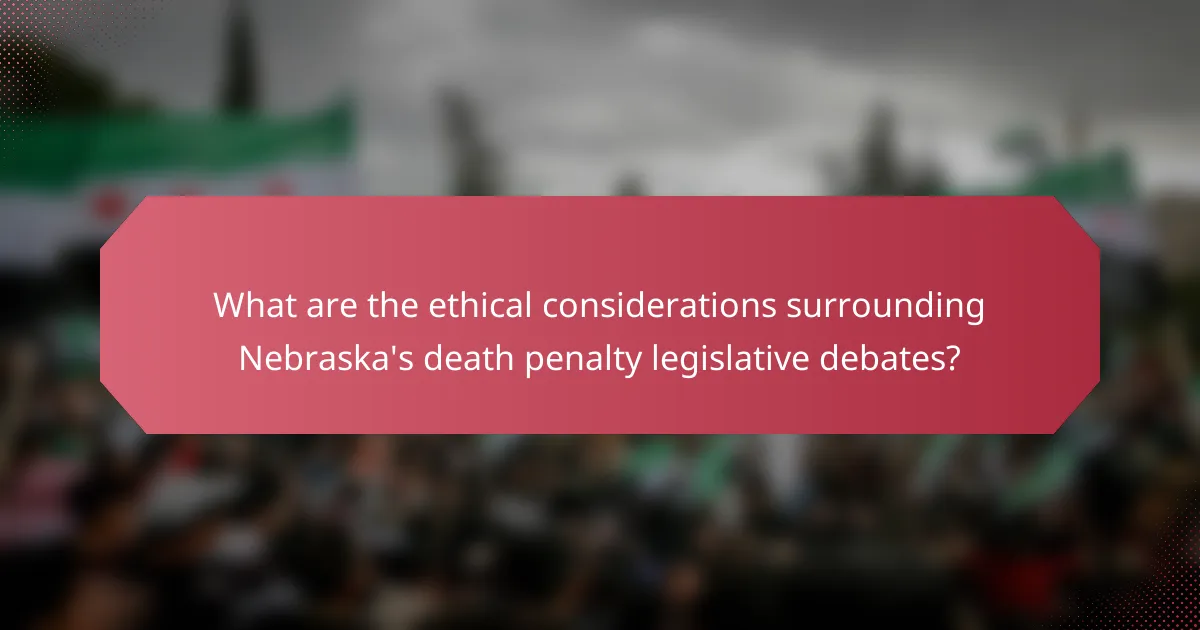
What are the ethical considerations surrounding Nebraska’s death penalty legislative debates?
The ethical considerations surrounding Nebraska’s death penalty legislative debates include the morality of capital punishment, the risk of wrongful executions, and the impact on marginalized communities. Critics argue that the death penalty is inhumane and violates the right to life. Studies show that racial bias can influence sentencing, disproportionately affecting people of color. Additionally, the financial burden of death penalty cases is significant, often costing more than life imprisonment. There is also a concern about the psychological impact on those involved in executions. These factors contribute to ongoing debates about the ethical implications of maintaining the death penalty in Nebraska.
How do ethical frameworks influence opinions on the death penalty?
Ethical frameworks significantly shape opinions on the death penalty. Different ethical theories lead to varying conclusions about its morality. For instance, utilitarianism may support the death penalty if it is believed to deter crime. In contrast, deontological ethics often oppose it, arguing that taking a life is inherently wrong. Religious ethical perspectives may also influence opinions, with some faiths advocating for forgiveness and rehabilitation. Studies show that individuals’ moral beliefs directly correlate with their stance on capital punishment. For example, a survey by the Pew Research Center found that 60% of Americans support the death penalty, often influenced by their ethical beliefs. Thus, ethical frameworks play a crucial role in shaping public opinion on this contentious issue.
What are the main ethical theories relevant to the death penalty debate?
The main ethical theories relevant to the death penalty debate include retributivism, utilitarianism, and deontological ethics. Retributivism argues that punishment is justified as a form of moral vengeance. It emphasizes that offenders deserve to be punished in proportion to their crimes. Utilitarianism focuses on the consequences of punishment. It assesses whether the death penalty deters crime and benefits society. Deontological ethics, on the other hand, emphasizes the inherent morality of actions. It questions the morality of taking a life, regardless of the consequences. Each of these theories provides a distinct perspective on the justification and implications of the death penalty.
How do these theories apply to the specific context of Nebraska?
Theories related to ethical considerations in legislative debates apply to Nebraska’s death penalty context by highlighting moral arguments for and against capital punishment. One prominent theory is utilitarianism, which evaluates the consequences of the death penalty on society. In Nebraska, proponents argue it deters crime, while opponents cite studies indicating no significant impact on crime rates.
Another relevant theory is deontological ethics, which focuses on the morality of actions themselves rather than their outcomes. This perspective raises questions about the morality of state-sanctioned killing, regardless of its deterrent effect. In Nebraska, this debate is intensified by wrongful convictions and the potential for executing innocent individuals.
Additionally, virtue ethics emphasizes the character of lawmakers and society’s values. In Nebraska, public sentiment has shifted towards rehabilitation over retribution, reflecting changing societal values. This shift influences legislative debates and decisions regarding the death penalty.
Overall, these theories provide a framework to analyze Nebraska’s death penalty discussions, revealing the complexity of ethical considerations involved.
What are the arguments for and against the death penalty in Nebraska?
Arguments for the death penalty in Nebraska include deterrence of crime and retribution for victims. Proponents argue that the death penalty serves as a deterrent against serious crimes, particularly murder. They believe that the fear of execution may prevent potential offenders from committing heinous acts. Additionally, supporters claim that the death penalty provides justice for victims and their families. They argue that it is a way to ensure that the most serious offenders receive appropriate punishment.
Arguments against the death penalty in Nebraska focus on the risk of wrongful convictions and ethical concerns. Opponents highlight that the judicial system is not infallible, leading to the possibility of executing innocent individuals. They cite cases where wrongful convictions have occurred, emphasizing the irreversible nature of the death penalty. Furthermore, critics argue that capital punishment is inhumane and disproportionately affects marginalized communities. They contend that it perpetuates a cycle of violence rather than promoting healing and justice.
What ethical arguments support the continuation of the death penalty?
The ethical arguments supporting the continuation of the death penalty include retribution, deterrence, and societal protection. Retribution is based on the belief that offenders deserve punishment proportional to their crimes. This is often seen as a moral imperative to deliver justice for heinous acts. Deterrence suggests that the death penalty may prevent future crimes by instilling fear of severe consequences. Studies have indicated that states with the death penalty may experience lower murder rates. Societal protection argues that executing dangerous criminals ensures they cannot harm others. This perspective emphasizes the safety and security of the community. These ethical arguments form the foundation for ongoing support of the death penalty in legislative debates.
What ethical concerns are raised by opponents of the death penalty?
Opponents of the death penalty raise several ethical concerns. They argue that it is inhumane and constitutes cruel and unusual punishment. This perspective is supported by the Eighth Amendment of the U.S. Constitution. Critics also highlight the risk of executing innocent people. Studies indicate that wrongful convictions can occur, leading to irreversible consequences. Additionally, opponents question the fairness of the death penalty. They point out racial and socioeconomic disparities in its application. There is also a belief that it does not effectively deter crime. Research shows that states without the death penalty often have lower murder rates. These ethical concerns reflect broader issues of justice and morality in society.
How do public opinions impact legislative debates on the death penalty?
Public opinions significantly influence legislative debates on the death penalty. Lawmakers often consider constituents’ views when discussing this contentious issue. High public support for abolition can lead to proposals for repeal. Conversely, strong support for capital punishment may encourage its retention or expansion. Polling data shows fluctuating public sentiment directly correlates with legislative action. For instance, states with higher opposition to the death penalty tend to enact moratoriums or abolish it. Additionally, public advocacy groups mobilize campaigns that shape legislators’ perceptions. Ultimately, public opinion serves as a critical barometer for lawmakers in the context of the death penalty.
What role does public sentiment play in shaping ethical considerations?
Public sentiment significantly influences ethical considerations in legislative debates, including those surrounding Nebraska’s death penalty. The views of the public can shape lawmakers’ decisions and ethical frameworks. For instance, strong public opposition to the death penalty has led to legislative changes in various states. In Nebraska, public opinion polls have shown fluctuating support for capital punishment, directly impacting legislative actions. Ethical considerations often align with public sentiment, as elected officials seek to reflect the values and beliefs of their constituents. Research indicates that states with strong anti-death penalty sentiment have seen reduced execution rates and legislative moves toward abolition. Thus, public sentiment acts as a critical driver in shaping the ethical landscape of death penalty discussions.
How have recent polls reflected the ethical dimensions of the death penalty debate?
Recent polls indicate a growing concern over the ethical implications of the death penalty. Many respondents express doubts about its fairness and effectiveness. For instance, a 2022 survey by the Pew Research Center found that 60% of Americans believe the death penalty is applied inconsistently. Additionally, 70% of those polled are worried about the possibility of executing an innocent person. These statistics highlight a significant shift towards viewing the death penalty as an ethical issue. The data suggests that ethical considerations are increasingly influencing public opinion on capital punishment.
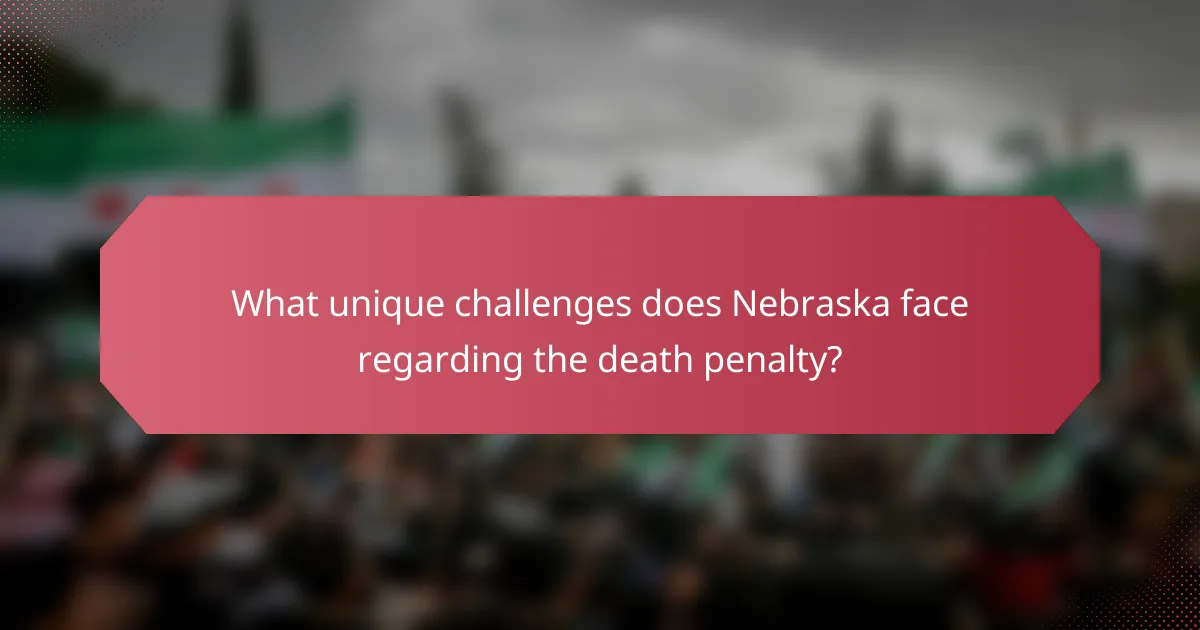
What unique challenges does Nebraska face regarding the death penalty?
Nebraska faces unique challenges regarding the death penalty, primarily due to legal and ethical controversies. The state has experienced changes in its execution methods and drug protocols. These changes have led to difficulties in obtaining lethal injection drugs. Additionally, public opinion in Nebraska is divided on the death penalty’s moral implications. There have been legislative attempts to abolish the death penalty, reflecting ongoing ethical debates. Furthermore, the state has faced legal challenges that question the constitutionality of its death penalty laws. These factors create a complex landscape for Nebraska’s approach to capital punishment.
How does Nebraska’s legal framework affect ethical debates on the death penalty?
Nebraska’s legal framework significantly influences ethical debates on the death penalty. The state’s laws establish the procedures for capital punishment, including the methods of execution and appeals process. These legal structures raise ethical questions about the fairness and humanity of the death penalty. For instance, Nebraska’s use of lethal injection has sparked discussions regarding the drugs used and their potential for causing suffering. Additionally, the legal framework allows for the possibility of wrongful convictions, which adds to the moral implications of executing innocent individuals. The state’s recent legislative changes, such as the abolition of the death penalty in 2015, reflect shifting ethical perspectives among lawmakers and the public. These changes have prompted ongoing debates about justice, deterrence, and the value of human life in the context of capital punishment.
What specific laws shape the ethical landscape of capital punishment in Nebraska?
The specific laws that shape the ethical landscape of capital punishment in Nebraska include the Nebraska Death Penalty Act and the U.S. Supreme Court rulings. The Nebraska Death Penalty Act outlines the procedures for capital punishment, including sentencing and appeals. It establishes the criteria for eligibility for the death penalty. Additionally, the U.S. Supreme Court rulings, such as Furman v. Georgia and Atkins v. Virginia, influence Nebraska’s application of the death penalty. These rulings address issues of arbitrary sentencing and the execution of intellectually disabled individuals. Together, these laws create a framework that impacts the ethical considerations surrounding capital punishment in Nebraska.
How do legal precedents influence ethical considerations in Nebraska?
Legal precedents significantly influence ethical considerations in Nebraska. They establish a framework for interpreting laws and guiding judicial decisions. In the context of the death penalty, precedents shape the ethical discourse surrounding its application. Cases such as *State v. Mata* have set standards for evaluating the constitutionality of capital punishment. These rulings inform public and legislative opinions on the morality of the death penalty. They also impact the arguments made by advocates and opponents. Ethical considerations are often framed within the context of these legal precedents. Thus, the interplay between law and ethics is critical in shaping the ongoing debates in Nebraska.
What role do advocacy groups play in shaping ethical discussions?
Advocacy groups play a crucial role in shaping ethical discussions. They raise awareness about specific issues related to ethics. These groups often represent marginalized voices and perspectives. They influence public opinion through campaigns and educational initiatives. Advocacy groups also engage in lobbying efforts to affect legislative changes. They provide research and data to support their positions. For example, organizations like the American Civil Liberties Union advocate against the death penalty by highlighting human rights concerns. Their efforts contribute to a broader dialogue on ethical implications in legislative debates.
Which organizations are most influential in Nebraska’s death penalty debates?
The most influential organizations in Nebraska’s death penalty debates include the Nebraska ACLU, Nebraskans for Justice, and the Catholic Conference of Nebraska. The Nebraska ACLU advocates for civil rights and has actively campaigned against the death penalty. Nebraskans for Justice focuses on promoting alternatives to capital punishment and addressing wrongful convictions. The Catholic Conference of Nebraska emphasizes the moral opposition to the death penalty, aligning with broader Catholic teachings on the sanctity of life. These organizations play key roles in shaping public opinion and legislative discussions regarding capital punishment in Nebraska.
How do these groups frame their ethical arguments for or against the death penalty?
Groups opposing the death penalty frame their ethical arguments around the sanctity of life and human rights. They argue that taking a life, even of a convicted criminal, is morally wrong. They emphasize the possibility of wrongful convictions, highlighting that 1 in 10 death row inmates may be innocent, as reported by the Innocence Project. Additionally, they point to studies showing that the death penalty does not deter crime more effectively than life imprisonment.
Conversely, proponents of the death penalty argue from a perspective of justice and retribution. They believe that capital punishment serves as a just consequence for heinous crimes. Supporters often cite the moral obligation to provide closure to victims’ families. They argue that certain crimes are so egregious that the death penalty is a necessary response to uphold societal values and deter future offenses.
Both sides utilize ethical frameworks to support their positions, focusing on the implications of justice, morality, and the potential for reform within the criminal justice system.
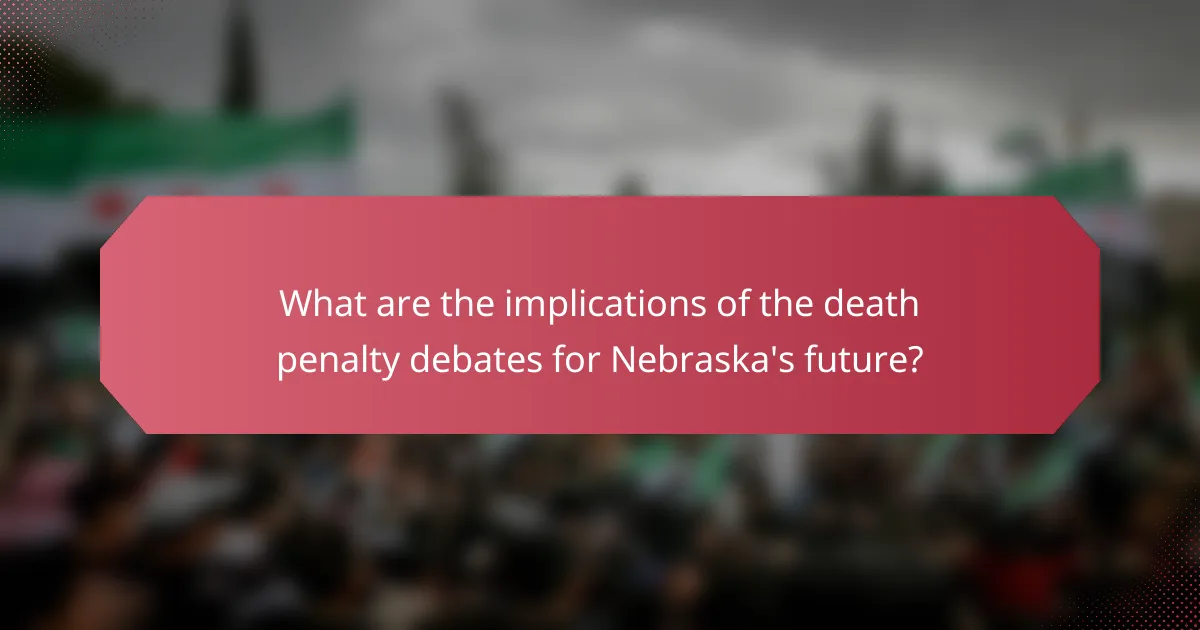
What are the implications of the death penalty debates for Nebraska’s future?
The death penalty debates in Nebraska could significantly shape the state’s future. Ongoing discussions reflect changing public opinions and ethical considerations. These debates may influence legislative decisions regarding the continuation or abolition of capital punishment. A shift in policy could alter the state’s criminal justice approach. Public sentiment has been increasingly leaning towards alternatives to the death penalty. This trend is supported by national statistics showing a decrease in executions. Furthermore, potential financial implications arise from the costs associated with death penalty cases. In 2015, a study indicated that death penalty cases in Nebraska were significantly more expensive than life imprisonment. Thus, the outcome of these debates may lead to profound changes in Nebraska’s legal landscape and societal values.
How might changes in legislation affect ethical perspectives on the death penalty?
Changes in legislation can significantly influence ethical perspectives on the death penalty. When new laws are enacted, they can reflect shifting societal values and moral considerations. For example, states that abolish the death penalty may signal a growing belief in the value of rehabilitation over retribution. Conversely, states that expand its use may reinforce a viewpoint that prioritizes punitive justice. Historical data shows that public opinion often shifts in response to legislative changes, indicating evolving ethical stances. In Nebraska, recent debates have highlighted concerns about wrongful convictions and racial disparities in sentencing. These factors can lead to a reevaluation of the moral implications surrounding capital punishment.
What potential outcomes could arise from shifts in Nebraska’s death penalty policy?
Shifts in Nebraska’s death penalty policy could lead to significant legal, social, and economic outcomes. Legal outcomes may include changes in the appeals process for death row inmates. This could result in longer or shorter times spent on death row depending on the new policy’s direction. Social outcomes might involve shifts in public opinion regarding capital punishment. For instance, increased public support for abolition could emerge if the policy shifts toward eliminating the death penalty. Economic outcomes could manifest through changes in state spending on legal processes associated with capital cases. Research indicates that states without the death penalty often save substantial funds compared to those that maintain it. Overall, shifts in policy could reshape the landscape of capital punishment in Nebraska, influencing various aspects of society and governance.
What best practices can be derived from the ethical debates on the death penalty?
Best practices derived from the ethical debates on the death penalty include ensuring transparency in the legal process. Transparency fosters public trust and accountability. Another practice is engaging in comprehensive public discourse. This involves including diverse perspectives to enrich the conversation. Additionally, implementing rigorous standards for evidence and legal representation is crucial. High standards help prevent wrongful convictions.
Moreover, continuous evaluation of the death penalty’s effectiveness as a deterrent is essential. Research shows mixed results on its deterrent effect, prompting re-evaluation. Lastly, prioritizing alternatives to the death penalty, such as life imprisonment without parole, can address ethical concerns while ensuring public safety. These practices reflect a commitment to justice and ethical governance in capital punishment discussions.
How can stakeholders engage ethically in discussions about the death penalty?
Stakeholders can engage ethically in discussions about the death penalty by promoting respectful dialogue and considering diverse perspectives. They should prioritize transparency and honesty in their communications. This includes sharing factual data and research to support their positions. Stakeholders must also listen actively to opposing viewpoints. Engaging with empathy can foster understanding and reduce polarization. Furthermore, stakeholders should avoid inflammatory language that may escalate tensions. They can reference ethical frameworks, such as utilitarianism or human rights principles, to guide their discussions. Ethical engagement requires a commitment to fairness and accountability throughout the discourse.
What lessons can be learned from Nebraska’s experience with the death penalty debates?
Nebraska’s experience with death penalty debates highlights the importance of public opinion in legislation. The state witnessed significant shifts in attitudes, particularly after a 2015 repeal of the death penalty. This repeal was driven by a coalition of diverse groups advocating for reform. The debates revealed the complexities of ethical considerations surrounding capital punishment. They emphasized the need for transparency and informed dialogue among lawmakers. Additionally, the impact of high-profile cases influenced public sentiment and legislative outcomes. The experience underscores the necessity for ongoing education about the implications of the death penalty. Overall, Nebraska’s journey illustrates how ethical discussions can shape legal frameworks and public policy.
The main entity of this article is Nebraska’s death penalty legislative debates, which encompass various ethical considerations such as the morality of capital punishment, the risk of wrongful executions, and the disproportionate impact on marginalized communities. Key information includes the influence of ethical frameworks like utilitarianism and deontological ethics on public opinion and legislative decisions, arguments for and against the death penalty, and the role of advocacy groups in shaping ethical discussions. The article also examines how legal precedents and public sentiment affect the ongoing debates, highlighting unique challenges faced by Nebraska in its approach to capital punishment.
